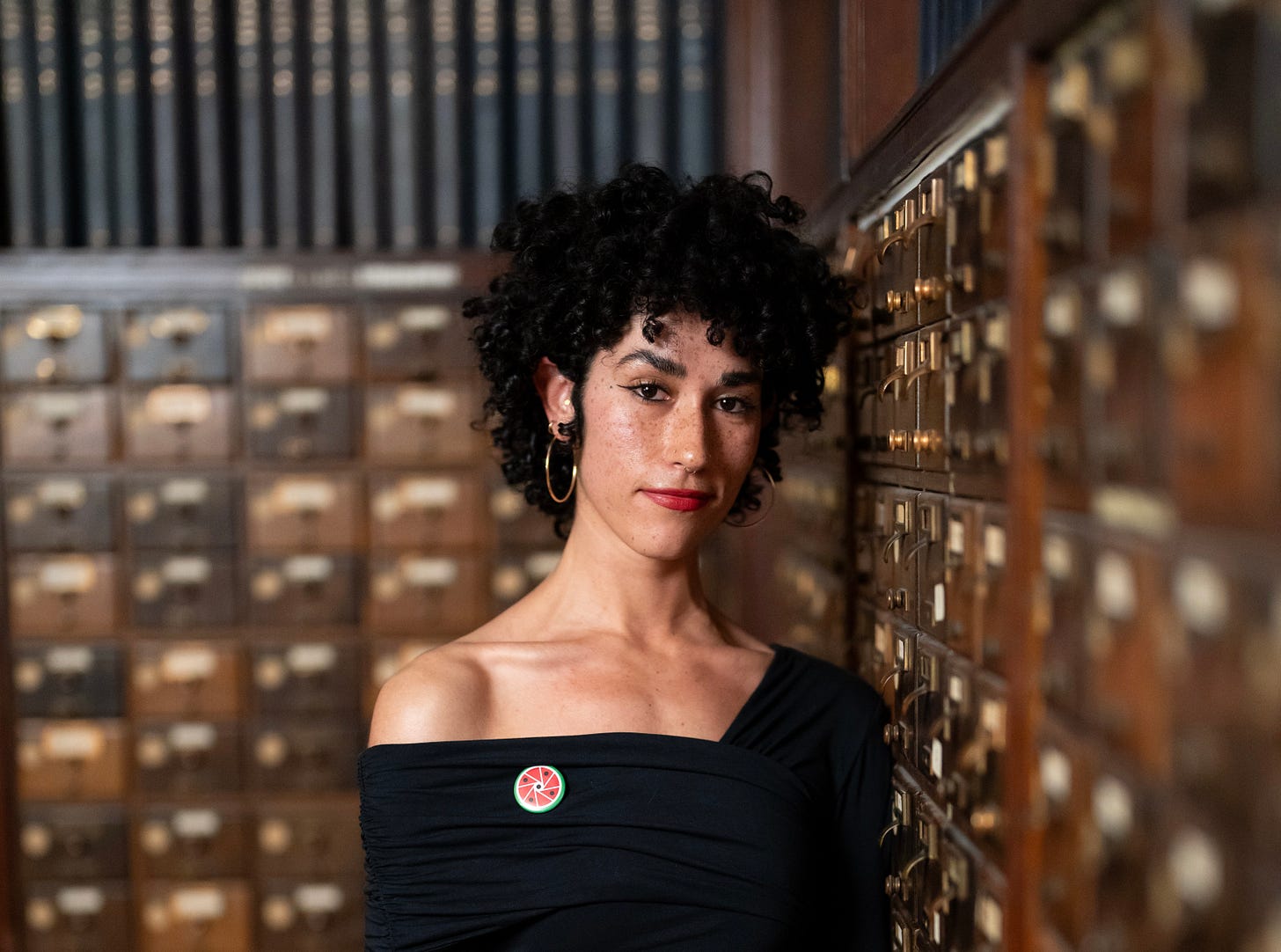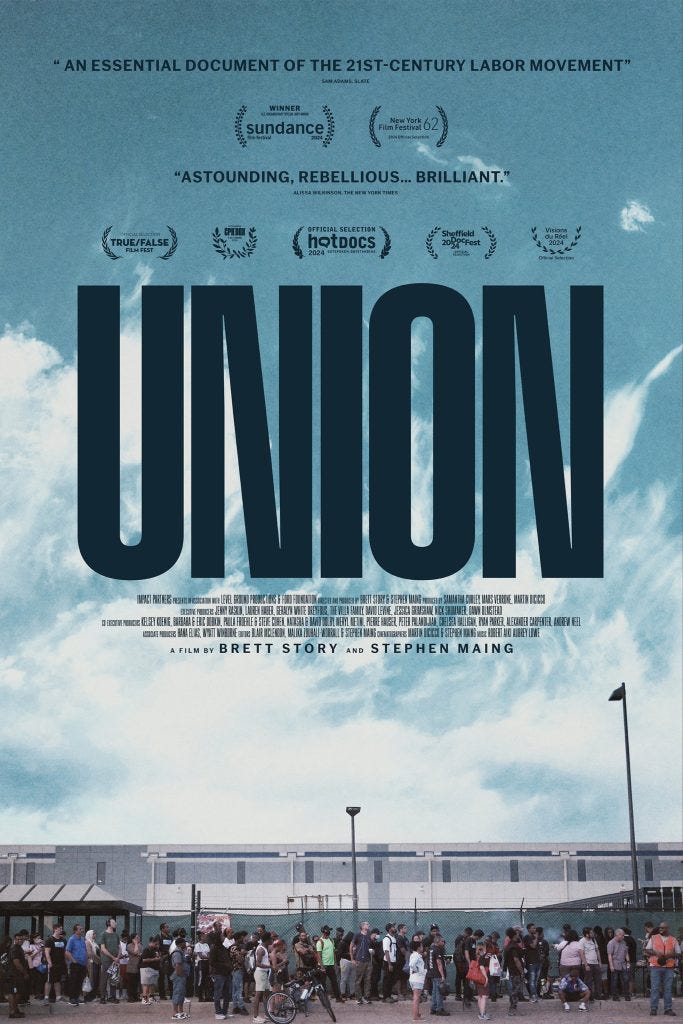“People are already so starved for quality films and principled political content,” says Mars Verrone, producer of Union, an award-winning documentary film on the first-ever winning campaign to unionize an Amazon warehouse.
Getting Union before viewers was no easy task. Amazon is a dominant force in the streaming industry and other big companies like Netflix are turning away from films with political overtones.
In the interview that appears below, Verrone describes the consolidation of the streaming services and how the team behind Union collaborated with labor movement allies to self-distribute the movie across the country.
We can relate to Verrone’s odyssey. We’re going to need independent media of all sorts more than ever as corporate media companies and their owners bend the knee to Trump.
In the past week, The Indypendent has published stories about an East Village church offering refuge to immigrants, pro-Palestine students at Barnard College standing up to a repressive administration, and reviews of two new books on teaching Palestine in the classroom and the disparate experiences of white and Black homeowners.
On our weekly Tuesday 5–6 pm radio show on WBAI-99.5 FM, we spoke with Peter Sterne of City & State about the latest in the Eric Adams corruption saga. We also spoke with Chuck Zlatkin of the American Postal Workers Union about Trump’s looming attacks on the postal service and with Jacobin columnist Liza Featherstone about why the Trump administration is intent on attacking the most popular services the government provides.
Resist Authoritarianism! Support The Indy Today!
Interview: How the Indie Amazon Labor Documentary “Union” Self-Distributed
By Nicky Yeager
Union is a gripping, sharp and artful documentary following the ragtag group of organizers who unionized the first Amazon warehouse, JFK8 in Staten Island, in 2022. Since premiering at Sundance last year, the documentary has played at around 100 film festivals, has won or been nominated for 16 awards, was included on this year’s Oscars shortlist, and was named on best-of-the-year lists in The New York Times and New York Magazine.
With all this buzz, why hasn’t a distributor picked it up? Despite the film’s critical acclaim, it has yet to secure a distribution deal on a major streaming platform. The filmmakers behind Union, who produced, shot and edited the film independently, are — not unlike the Amazon worker-organizers gracing their frames — scrappy, dogged and up against a huge machine. Once self-releasing emerged as the only option, Union’s production team decided to roll out its own distribution plan last fall. The Indypendent sat down with producer Mars Verrone to talk about how they did that and more.
This interview has been edited for length and clarity.
The Indypendent: Can you describe how distribution is supposed to work for documentaries?
Mars Verrone: The dream scenario of what happens, which almost never happens, is: you get into a major festival like Sundance, you premiere, and then, if you haven’t already sold your film, you get the attention of buyers, and offers for distribution deals come your way. A few years ago, independent documentaries were being picked up by streamers for millions of dollars out of film festivals. I think that was just an anomalous moment, and that bubble has totally burst. Now, if you’re lucky enough to get a distribution deal, the sale is significantly smaller. But more and more indie documentarians are struggling to get any kind of distribution.
Why do you think Union has not been picked up?
I think with any political film, it’s really hard. Buyers and distributors gave us a mixed bag of responses during the making of the film. Some people said, “Oh, this is an amazing project. It’s a no-brainer. Of course you’ll get [a distribution deal], easy.” Other people said, “you’re totally crazy. No one will ever buy this.”
Where was that cynicism coming from?
I think that was about the specificity of Amazon. Some people like to theorize that Amazon is censoring this film behind the scenes. While I don’t know if that’s true, the ubiquity of Amazon in the tech and media spheres is certainly part of the reason we didn’t receive distribution offers from major players. Every big streaming platform is hosted on Amazon Web Services or is somehow in business with Amazon. Amazon was a major sponsor of many pitch markets we participated in as well as the Sundance Film Festival, where we premiered.
Most, if not all of these major distributors have engaged in union-busting activity. For how popular unions are among the public, with historically high bipartisan approval ratings, I suspect there was still hesitancy around labor organizing as our subject matter.
Because of all of this, we had a healthy skepticism of not expecting to get a big sale out of Sundance, so in the months prior we started mentally and somewhat logistically preparing to distribute it ourselves.
Tell me about self-distribution.
Self-distribution basically means playing a film in movie theaters, making it available to rent and stream online, getting it into schools and libraries, and doing all the work to market and promote it yourself. Usually, you have a big company working on all these things. We had a team of less than 20 people!
We tried to connect every part of our distribution with labor-movement activity. When we put the film in theaters, we played in 20 different cities and tried to have post-screening panels platforming, ideally, Amazon workers, but if not, local union representatives and organizers who could speak to how to support labor efforts locally.
For the online rental release, we used a “pay it forward” feature. When people rented the film, they could also donate so an Amazon worker could watch it for free. We also set up an affiliate rental link system with labor-movement partners, like Jobs with Justice, SEIU, EWOC, Hip Hop Caucus, the Labor Force and more. If you rented the film using the SEIU link, SEIU would receive 25% of that rental sale.
How have you collaborated with workers and organizers in the distribution phase?
We’ve had a lot of cool screenings followed by Q&As with Amazon Labor Union workers who are in the film. We did one in North Carolina with an independent union called CAUSE that actually now has an upcoming union election at their [Amazon] warehouse. We had two ALU organizers from Staten Island join. It was an incredible thing to have workers from across the country just be able to talk shop about organizing.
I think for the ALU organizers, the documentary is helpful as a device for self reflection. None of them see the film as, “Here’s the blueprint for how you organize Amazon.” It’s about the nitty gritty of group dynamics and organizing. It can be a tool in the sense that: “This was an experiment; this was imperfect, but we can use this to learn and build a stronger labor movement.”
Talk about how streaming services have affected the film industry.
The way streamers platform and distribute films is based on algorithms and beholden to shareholders. It’s all based on clicks and watches and “watchable” content. While there are certain subjects — like labor organizing — that I think are actively being de-platformed, overall a lot of the streamers’ behavior is pragmatic since the goal is viral content. If it isn’t Love Is Blind or whatever digestible, viral-able content you’re going to get people clicking on, there’s no incentive to platform it. The only incentive is maybe if the streamers want to win an Oscar [for prestige purposes].
The film industry’s market consolidation has been getting worse for a long time and is likely to accelerate under Trump. Tell me about how you see independent media in this moment.
Labor organizing is going to be under assault under the Trump administration, and independent media making will become much more challenging. Cutting things like public media and arts funding is a stated part of this administration’s agenda. When the opportunities are closing in this much, we should force something new to emerge. And given how bad things are now, we actually don’t want to continue with business as usual. We don’t want to go back to the old ways. There is now an opening to create a radically different media landscape — one where independent cinema can flourish, leftist politics can be platformed and film workers can sustain themselves.
People are already so starved for quality films and principled political content. There’s a proven audience for independent cinema, and if the only type of thing Netflix offers is the Jake Paul-Mike Tyson fight and films that are made to be played in the background while you look at your phone, that’s going to create a situation where people have to go somewhere else for their media. Audiences more and more are feeling like, “This sucks.” Vast audiences have abandoned these subscription-based platforms altogether to watch more accessible content on YouTube, Twitch and social media.
Audiences and filmmakers are both unhappy. We’re going to have to figure out how to make independent media, sustain ourselves in this work and reach people. It’ll be very hard to do, but rather than filmmakers asking, “How do I get my film on Netflix?” the question is becoming “Who is my audience, and how do I reach them?” None of that is figured out, but I have optimism for what it will generate. I think perspectives are shifting and energy is being directed in new places.




